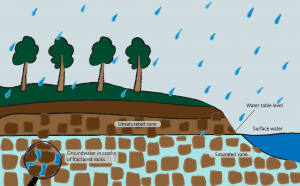- SIWI – Leading expert in water governance
- /
- Latest
- /
- Landmark court case strengthens Human Rights principles
Landmark court case strengthens Human Rights principles
On 16 June, ten years have passed since the UN Guiding Principles on Business and Human Rights were endorsed by the Human Rights Council of the UN. Just in time for the anniversary, a landmark ruling in a Dutch court showed that the principles can also be used to hold multinational corporations accountable for their contribution to climate change.

In May 2021, a Dutch court case against the oil company Shell recognized that the corporate responsibility to respect human rights is a global standard of conduct. The judgement has been called revolutionary for being the first where a multinational corporation is held responsible for its contribution to climate change – the effects of which the Judge firmly links to various water-related consequences. The Court found that the Shell group has their own obligation, independent from the state’s, to reduce CO2 emissions. The reasoning draws on international soft law, including the UN Guiding Principles on Business and Human Rights (UNGPs) that are “endorsed by” Shell, to interpret an unwritten ‘standard of care’ pursuant to the Dutch Civil Code. The “human rights and the values they embody” were also factored in.
The duty of care of companies like Shell to act against climate change is now regarded a matter of law, even if Shell appeals. This ruling could have implications for other big polluters. Companies that share responsibility for emissions, and have made similar commitments to respect human rights, could face climate change litigation on the same grounds.
Another sector, responsible for emissions, that could be affected by this ruling is textile. SIWI has worked with improving the sustainability of the textile sector for many years. It is often held that it causes 10% of all GHG emissions, and that fashion is the second most polluting industry on the planet after oil. Now, these statements may neither be based on credible research nor robust analysis, only repeated so often that they have become accepted as facts. It is clear the textile sector is responsible for emitting CO2, we just lack precise data to know exactly how much.
The calculations are made trickier because textiles manufacturing involves the longest and most complicated of value chains. Now, suppliers and sub-suppliers ‘upstream’ are also covered by the UNGPs. This was something the Court considered, with the Judge saying that Shell “may be expected to take the necessary steps to remove or prevent the serious risks ensuing from the CO2 emissions generated by the business relations” (emphasis added). In other words, the Shell Group must as much as possible use its influence to limit any lasting consequences — also in relation to its suppliers and end-users’ emissions.
Regardless of the intricate value chains in the textile business, it is not far-fetched to predict that future reasoning will go in the same direction at least for the major players in this field. Each of them need to take due responsibility for their own (lack of) actions and contributions to climate change. The responsibility of business enterprises to respect human rights, as formulated in the UNGP, is a global standard of expected conduct for all business enterprises wherever they operate.
Timely, June 2021 marks the tenth anniversary of the endorsement by the Human Rights Council of the UNGPs. This ruling is not a bad way to celebrate.
An advisor to the claimants in the Shell case, Jan van de Venis, Human Rights Lawyer and Dutch Ombudsperson for Future Generations, was the moderator of a panel of experts during the WWW seminar Information, governance and justice for climate resilience, co-arranged by the UNDP–SIWI Water Governance Facility.
An interactive session of the same seminar series allowed the audience to discuss expectations for lawsuits, and how litigation efforts can be leveraged to achieve justice. A message from this was that water outcomes are central in climate litigations; though court cases alone will not achieve justice, they are transformative in pushing action and shifting policy landscapes over time.








